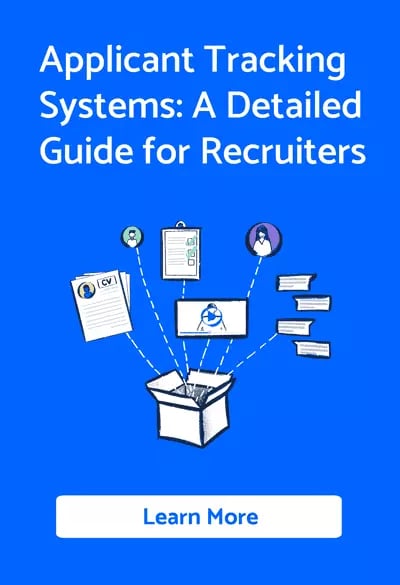Learning how to conduct an interview is the first step to achieving your recruiting goals. Although it seems like a challenging task, it provides a great experience to recruiters who want to succeed in boarding the best candidates for different job openings in the company.
Importance of preparation
An interview with a well-planned recruitment strategy can give you a realistic view of what should be planned for the following hiring process. From the job posting to an ATS resume screening, question lists to performance evaluation, and final selection to onboarding, you will get an excellent opportunity to evaluate every parameter before deciding to onboard the candidate for the required job role.
In the company, every job role is different from the others. Some require a one-on-one interview, while others need group, panel, and virtual interviews.
However, an overview of essential steps in the interview process can help you make a roadmap of your hiring goals.
Preparation
Interview round preparation is the first step to delivering a world-class recruiting experience to candidates. Before planning a face-to-face interview round with the applicant, you should strategise the entire process in easy steps:
Identifying the purpose and goals of the interview
The recruiting manager must consider the purpose of posting job vacancies for candidates. What is your company's goal in requiring someone to fulfil this job role? Get yourself a checklist of questions like:
- Have you reviewed the job description, requirements, roles, and responsibilities?
- Do you have all the information regarding the company's vision, mission, and structure?
Researching the candidate and the company
Nowadays, digital technology has been widely accepted to aid the recruitment process. The best HR software has become a new hiring platform for recruiters where they can not only post the descriptions on popular job boards in the UK along with company goals but also get the list of applicants as job seekers for different roles.
Before planning your interview, ensure you have matched the candidate’s skills mentioned in the resume with the job requirements.
Creating a list of relevant questions
If you are going to schedule hiring for multiple positions, create a list of questions to be asked of the applicants. Here are some of the considerations when planning an interview round:
- Have you prepared a list of questions to be asked in the general, technical, and final rounds?
- Have you considered behavioural and situational questions in the list?
- Have you prepared the list to ask the interviewee about the time of joining, CTC, and the terms and conditions to be fulfilled for joining your company?
Arranging the logistics of the interview
Craft a few questions to assess each skill you are looking for. Also, look out for candidates who can bring a new perspective to your team.
Use an applicant tracking system to arrange all logistics of the interview rounds.
Conducting the Interview
An interview is a big round for recruiters as well as job seekers. Being ready to interview on your side is important as dedicated job seekers usually come prepared to take the job in your company. As a hiring manager, try to determine every aspect of getting the right fit for the job.
Starting the interview: making a good first impression
The greeting is the first gesture of what you’re going to represent on behalf of your company. Before jumping into the technical round, welcome the candidates with a smile and offer them a glass of water or a cup of tea.
Never be in a hurry but give the applicants time to settle into the interview.
Asking questions effectively
General questioning round:
- Can you introduce yourself?
- Can you tell me your hobbies, interests, or achievements?
- What are your achievements and failures in life? What is your greatest strength and weakness?
Technical knowledge-based questioning round:
- Why do you want to work for this company?
- How many years of experience do you have in a relevant field?
- What online resources do you use to help you do your job?
- How do you keep your technology skills current?
- Can you tell me about a live project experience you had in your professional career?
- How do you think technology advances will impact your job?
- What is your most impressive work achievement?
Situation-based questioning round:
- Can you tell me about a challenge or conflict you overcame at work?
- Why do you want to work at this company? How would you indulge your team members in a project they are least interested in?
Listening actively and taking notes
Be an active listener to the applicant during the interview round. Make a list of evaluations for every question the candidate asks to make an informed hiring decision based on their answers. Take notes of the following categories or parameters to be evaluated during the interview rounds:
- Body language
- Technical skills
- Personality
- Communication skills
- Engaging conversation
Evaluating the candidate's responses
The final evaluation of a candidate’s response allows you to closely examine which candidate is the right fit for the job role.
It includes:
- Academic skills
- Work experience
- Cultural fit
- Assignment or test scores
- Compare salary expectation
- Verification of responses
- Timeline expectation
Closing the interview: next steps and follow-up
As a recruiting manager, your interview closing with the applicant should be as warm as the welcome.
Some job posts require the immediate joining of the candidates. So, you must be prepared to announce the interview result on the same day and proceed with the joining formalities as soon as possible.
If you are hiring for multiple openings, you can plan the interview closing by explaining when an applicant can expect to hear from you. The final result of the applicant’s evaluation can be communicated to them via email, SMS, or a phone call.
Post-Interview Evaluation
A candidate’s post-interview evaluation form can be generated on recruitment software and shared with the company's managing directors.
Reviewing the notes taken during the interview
Make a shortlist of candidates and assign columns to create essential notes for every impressive answer relevant to the job role you received from them. Using particular keywords can help you remember important points from the interview, like work experience, day-to-day work routine, team collaboration, additional skills, notice period, etc.
Evaluating the candidate's skills and fit for the role
Opt for a scorecard, assessment, or grade system in the best recruitment software to finalise job seekers' academic, technical, personal, professional, and communication skills. The top 5 or 10 highest score achievers will be moved to the next round.
Considering any red flags or areas of concern
Often, the shortlisted candidate matches three of your job requirements and leaves areas of concern in the field like salary, notice period, work shift, or commuting issues.
Discuss it with the company's CEO and look for potential actions for this situation in the hiring process.
Making a decision and communicating the outcome to the candidate
The final evaluation based on skills and overall interview experience will help you decide whether to go with the shortlisted applicant.
If yes, you should proceed further by informing the applicants about the interview result via mail, sms, or calling the candidate, and they're joining by sending them an offer letter mentioning agreed terms and conditions like CTC, date of joining, probation period, etc.
Set a reminder to check on the shortlisted individuals between the joining period to ensure the final onboarding process.
Conclusion
Interviewing to get the best candidate is an arduous task. However, when you know how to conduct an interview, you can easily find out what a job application, cover letter, and resume cannot always tell you.
Asking relevant questions and following a well-structured interview process can help you decide how well an applicant's skills, experience, and personality align with the company's needs and avoid costly hiring mistakes.
You can make your interview process easy and hassle-free by using ATS software which can fast-track your interview skills.
References and Additional Resources
Books on interview techniques and best practices
Interview success will take time and experience. It needs a proper recruiting strategy plan to understand the company's requirements and follow a hierarchy to execute all steps of the hiring process. Here is a list of books to read for further information on practices:
- The art of the interview (James Storey)
- Topgrading: The Proven Hiring and Promoting Method That Turbocharges Company Performance (Bradford D. Smart)
- HR Interview Questions You Should Be Asking (Engrave - Awards & More)
- Hiring for Attitude: A Revolutionary Approach to Recruiting and Selecting People with Both Tremendous Skills and Superb Attitude (Mark Murphy)
Websites and forums for HR professionals
Recruiting managers can go through different websites to learn about the hiring process, like challenges to be experienced and solutions to use during interview rounds, candidate evaluation, and onboarding.
Tools and resources for tracking and organising interview data
Use an ATS system to find out how well your interview process has been going with the applicants. Moreover, you can also organise and analyse past interview data to plan the following hiring needs in the company.
Frequently Asked Questions
What are the steps to conduct an interview?
An interview is a process to hire a candidate based on their skills and work experience. Go through important steps to be considered while interviewing for a particular job role:
- Prepare for the interview
- Understand the interview process and divide it into steps
- Go through the job description and the importance of the job role
- Describe the company and job role to the applicant
- Explore the career goals of the applicants
- Prepare a list of questions to be asked in different interview rounds
- Get insight into other relevant achievements or work experience
- Give proper time to the candidates to ask questions
- Close the interview by communicating the feedback and
follow up process
What are the 7 steps in an interview?
As a recruiting agency or hiring manager, you should follow 7 steps to ensure a smooth and productive interview:
- Greet the candidates: Start the interview by greeting them warmly and professionally.
- Verification: Verify their identity by checking their resume and submitted details.
- Welcoming gesture: Engage in small talk to help put the applicant at ease. It can include discussing their travel to the interview location, the weather, or other non-work-related topics.
- Explain the interview process: Start with the general interview round and then proceed with the experts or managers for the technical or descriptive match.
- Offer refreshments: If applicable, offer them a glass of water or another beverage to help them feel more comfortable.
- Explain the job and company: Provide an overview of the job and the company, including the company's mission and values, the responsibilities of the role, and what you're looking for in the applicants.
- Obtain consent: Obtain the candidate's consent to interview by asking them if they're ready to start.
What do you say at the beginning of an interview?
The first step of starting an interview is to greet the applicant with a warm gesture and small talk to make them feel comfortable.
How do you write and conduct an interview?
You must prepare for the interview process as a hiring manager or recruiting agency. To do that, clarify the process to evaluate candidates' performance in the interview round.
- General round: Introduction and questions about the candidate such as hobbies, family, etc.
- Detailed round: Work experience in a specific domain and an online or written test.
- Evaluation round: Scores or marks achieved in the test and overall interview performance.





